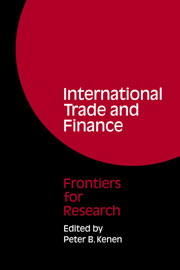Book contents
- Frontmatter
- Contents
- List of Contributors
- Preface
- PART I TRADE, PROTECTION, AND DOMESTIC PRODUCTION
- PART II ECONOMETRIC MODELS OF TRADE AND PAYMENTS
- Part III PAYMENTS ADJUSTMENT AND THE MONETARY SYSTEM
- PART IV AN OVERVIEW AND AGENDA
- What We Need to Know: Panel Discussion
- Glossary of Frequently Used Acronyms
- Author Index
What We Need to Know: Panel Discussion
Published online by Cambridge University Press: 05 November 2011
- Frontmatter
- Contents
- List of Contributors
- Preface
- PART I TRADE, PROTECTION, AND DOMESTIC PRODUCTION
- PART II ECONOMETRIC MODELS OF TRADE AND PAYMENTS
- Part III PAYMENTS ADJUSTMENT AND THE MONETARY SYSTEM
- PART IV AN OVERVIEW AND AGENDA
- What We Need to Know: Panel Discussion
- Glossary of Frequently Used Acronyms
- Author Index
Summary
I have been asked to open this panel discussion, which is designed to explore the directions in which future research in international economics should go. I shall do so by trying to provoke the distinguished panelists with a few questions not covered by the discussions at earlier sessions, questions which seem to me worth investigation. In particular:
1. How general is the Canadian case under which capital continues to flow after the adoption of a floating exchange rate?
2. With a floating pound sterling, will capital continue to move, as with the Canadian dollar, or dry up under the pressure of increased exchange risks?
3. How realistic is it to attempt to devise a system that is in all respects symmetrical, or is asymmetry inherent in the relations between trading and financial centers?
4. Is there room in international economic research for economic history, as opposed to econometrics, to examine more deeply how the prewar gold standard functioned with very little liquidity by modern standards, how the Franco-Prussian indemnity was transferred, how the Baring crash was surmounted, how the Latin Monetary Union functioned, and so on?
5. To move to current matters, in the determination of foreign exchange and balance-of-payments policy, are econometrics and rigorous mathematical analysis adequate substitutes for experience with, and a feeling for, markets? I have the impression that the passive attitude toward the devaluation of February 1973 was determined in Washington, without much input from the market experts in New York.
- Type
- Chapter
- Information
- International Trade and FinanceFrontiers for Research, pp. 503 - 528Publisher: Cambridge University PressPrint publication year: 1976

